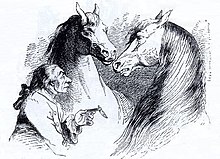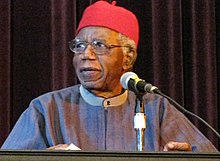Gulliver's Travels

 |
| Gulliver in first part |
 |
| Gulliver in second part in hand of giant man |
 |
| Gulliver observed by scientists |

 |
| Fourth voyage |
 |
| Gulliver in third voyage |
Gulliver's Travels is the most admired satirical work by Jonathan
Swift. Gulliver- the protagonist visits four different lands like Lilliput, Brobdingnag,
Blefuscu and Houyhnhnm.
For a longer period of time this book is considered as a book
for children. but it has a deep hidden political satire. Swift satirizes his own
Nation as well as other institutions of society.
In Lilliput people were tiny nearly six inches tall. it symbolically
suggests the narrow mindedness of people.
In the second part people were giant in their height. There is
also reference of two powerful nations, symbolically read as England and France,
which were constantly fighting.
In Laputa, they have to keep flappers to wake them up. This is
the bold criticism on intellectual people.
He criticized such an extent that horses were better there than
humans. and when he returns, he prefers to live with animals than human community.
While reading the book it looks as if we are laughing on our
own follies.
A possible reason for the book's classic status is that it can be seen as many things to many different people. Broadly, the book has three themes:
- A satirical view of the state of European government, and of petty differences between religions
- An inquiry into whether men are inherently corrupt or whether they become corrupted
- A restatement of the older "ancients versus moderns" controversy previously addressed by Swift in The Battle of the Books
In terms of storytelling and construction the parts follow a pattern:
- The causes of Gulliver's misadventures become more malignant as time goes on—he is first shipwrecked, then abandoned, then attacked by strangers, then attacked by his own crew.
- Gulliver's attitude hardens as the book progresses—he is genuinely surprised by the viciousness and politicking of the Lilliputians but finds the behaviour of the Yahoos in the fourth part reflective of the behaviour of people.
- Each part is the reverse of the preceding part—Gulliver is big/small/wise/ignorant, the countries are complex/simple/scientific/natural, and the forms of government are worse/better/worse/better than England's.
- Gulliver's viewpoint between parts is mirrored by that of his antagonists in the contrasting part—Gulliver sees the tiny Lilliputians as being vicious and unscrupulous, and then the king of Brobdingnag sees Europe in exactly the same light; Gulliver sees the Laputians as unreasonable, and his Houyhnhnm master sees humanity as equally so.
- No form of government is ideal—the simplistic Brobdingnagians enjoy public executions and have streets infested with beggars, the honest and upright Houyhnhnms who have no word for lying are happy to suppress the true nature of Gulliver as a Yahoo and are equally unconcerned about his reaction to being expelled.
- Specific individuals may be good even where the race is bad—Gulliver finds a friend in each of his travels and, despite Gulliver's rejection and horror toward all Yahoos, is treated very well by the Portuguese captain, Don Pedro, who returns him to England at the novel's end.
Of equal interest is the character of Gulliver himself—he progresses from a cheery optimist at the start of the first part to the pompous misanthrope of the book's conclusion and we may well have to filter our understanding of the work if we are to believe the final misanthrope wrote the whole work. In this sense Gulliver's Travels is a very modern and complex novel. There are subtle shifts throughout the book, such as when Gulliver begins to see all humans, not just those in Houyhnhnm-land, as Yahoos.
Throughout, Gulliver is presented as being gullible; he believes what he is told, never perceives deeper meanings, is an honest man, and expects others to be honest. This makes for fun and irony; what Gulliver says can be trusted to be accurate, and he does not always understand the meaning of what he perceives.
Also, although Gulliver is presented as a commonplace "everyman", lacking higher education, he possesses a remarkable natural gift for language. He quickly becomes fluent in the native tongue of any strange land in which he finds himself, a literary device that adds much understanding and humour to Swift's work.
Despite the depth and subtlety of the book, it is often classified as a children's story because of the popularity of the Lilliput section (frequently bowdlerised) as a book for children. One can still buy books entitled Gulliver's Travels which contain only parts of the Lilliput voyage.
work cited:-
Wikipedia contributors. "Gulliver's Travels." Wikipedia, The Free Encyclopedia. Wikipedia, The Free Encyclopedia, 15 Feb. 2016. Web. 17 Feb. 2016.
